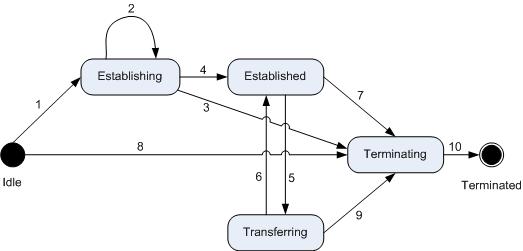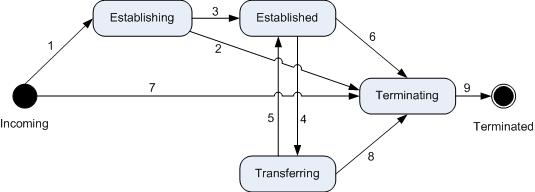An AudioVideoCallobject represents an SDP-based audio/video session between a local participant and a remote participant. An AudioVideoCallobject cannot exist on its own and must be associated with a Conversationobject.
The AudioVideoCallclass handles the “audio” and “video” media types.
 AudioVideoCall State Transitions
– Outbound Calls
AudioVideoCall State Transitions
– Outbound Calls
The AudioVideoCallstate transitions for an outbound call are shown in the following illustration.

- The transition from
Idleto
Establishingoccurs when the application calls
BeginEstablishon the call.
- The transition from
Establishingto
Establishingoccurs when the application receives the first
ringing notification from the remote side while the call is in the
Establishingstate.
- The transition from
Establishingto
Terminatingoccurs when
BeginEstablishfails, or when the application calls
BeginTerminateon the call, or when the application calls
BeginTerminateon the conversation that contains this call.
- The transition from
Establishingto
Establishedoccurs when
EndEstablishcompletes successfully.
- The transition from
Establishedto
Transferringoccurs when the application calls
BeginTransferon the call.
- The transition from
Transferringto
Establishedoccurs when
BeginTransferis unsuccessful.
- The transition from
Establishedto
Terminatingoccurs when the application calls
BeginTerminateon the call, or when the remote side
terminates the call, or when the application calls
BeginTerminateon the conversation that contains this call.
- The transition from
Idleto
Terminatingoccurs when the application calls
BeginTerminateon the call, or when the application calls
BeginTerminateon the conversation that contains this call.
- The transition from
Transferringto
Terminatingoccurs when the transfer operation completes
successfully, or when the application calls
BeginTerminateon the call, or when the application calls
BeginTerminateon the conversation that contains this call.
- The transition from
Terminatingto
Terminatedoccurs when
EndTerminatecompletes.
 AudioVideoCall State Transitions
– Inbound Calls
AudioVideoCall State Transitions
– Inbound Calls
The AudioVideoCallstate transitions for an inbound call are shown in the following illustration.

- The transition from
Incomingto
Establishingoccurs when the application calls
BeginEstablishon the call.
- The transition from
Establishingto
Terminatingoccurs when the call is not accepted, or when the
application calls
BeginTerminate, or when the application calls
BeginTerminateon the conversation that contains this call.
- The transition from
Establishingto
Establishedoccurs when the call is accepted (when
BeginAcceptreturns successfully).
- The transition from
Establishedto
Transferringoccurs when the application calls
BeginTransferon the call.
- The transition from
Transferringto
Establishedoccurs when
BeginTransferis unsuccessful.
- The transition from
Establishedto
Terminatingoccurs when the application calls
BeginTerminateon the call, or when the remote side
terminates the call, or when the application calls
BeginTerminateon the conversation that contains this call.
- The transition from
Incomingto
Terminatingoccurs when the application calls
Decline,
Forward, or
BeginTerminateon the call, or when the application calls
BeginTerminateon the conversation that contains this call,
or when the remote side cancels its call request.
- The transition from
Transferringto
Terminatingoccurs when the application calls
BeginTerminate, or when the transfer operation completes
successfully, or when the application calls
BeginTerminateon the conversation that contains this call.
- The transition from
Terminatingto
Terminatedoccurs when
EndTerminatecompletes.
 AudioVideoCall
Constructors
AudioVideoCall
Constructors
The AudioVideoCallclass has the following constructor.
 Copy Code Copy Code
|
|
|---|---|
// Initializes the call based on the conversation and the signaling session. public AudioVideoCall(Conversation conversation); |
|
 AudioVideoCall Properties
AudioVideoCall Properties
The following are the public properties on the AudioVideoCallclass.
 Copy Code Copy Code
|
|
|---|---|
// Gets or sets the default media type for this call. For an
AudioVideo call, the default media type is Audio.
public override string DefaultMediaType {get; set;}
// Gets a list of the supported media names,
// which are acceptable m-lines in an SDP offer/answer.
// For InstantMessagingCall Message is the only supported
MediaType.
public override IEnumerable<string> SupportedMediaTypes
{get;}
// Gets the audio video flow associated with this call.
public AudioVideo.AudioVideoFlow Flow {get;}
|
|
 AudioVideoCall Methods
AudioVideoCall Methods
The following are the public methods on the AudioVideoCallclass.
 Copy Code Copy Code
|
|
|---|---|
// Initiates a transfer request to the remote participant to transfer // the current call to the given transfer target in Attended or Unattended mode. // In Unattended mode, the call is terminated as soon as the transfer request is accepted by the remote participant. // In Attended mode, the call monitors the success/failure // notifications from the remote regarding how the transfer is being carried out. // If the transfer succeeds, this call is terminated; // otherwise, the call is not affected. public IAsyncResult BeginTransfer( String targetUri, AsyncCallback userCallback, object state); // Initiates a transfer request to the remote participant to transfer // the current call to the given transfer target in Attended or Unattended mode. // In Unattended mode, the call is terminated as soon as the transfer request is accepted by the remote participant. // In Attended mode, the call monitors the success/failure // notifications from the remote regarding how the transfer is being carried out. // If the transfer succeeds, this call is terminated; // otherwise, the call is not affected. public new IAsyncResult BeginTransfer( String targetUri, CallTransferOptions callTransferOptions, AsyncCallback userCallback, object state); // Initiates a transfer request to the remote participant // of the current call to replace another existing call in Attended mode. // This is a Supervised transfer since the operation involves another // call. This method waits for success/failure notifications from the // remote regarding how the transfer is being carried out at the remote side. // When the transfer by the existing remote participant // succeeds, the current call is terminated. If the transfer fails, // the call is not affected. // If callToReplace is passed as the instance of the call that // initiates the transfer, this is considered a self-transfer. public IAsyncResult BeginTransfer( Call callToReplace, AsyncCallback userCallback, object state); // Initiates a transfer request to the remote participant // of the current call to replace another existing call in Attended mode // This is a Supervised transfer since the operation involves another // call. This method waits for success/failure notifications from the // remote regarding how the transfer is being carried out at the remote side. // When the transfer by the existing remote participant // succeeds, the current call is terminated. If the transfer fails, // the call is not affected. // If callToReplace is passed as the instance of the call that // initiates the transfer, this is considered a self-transfer. public IAsyncResult BeginTransfer( Call callToReplace, CallTransferOptions callTransferOptions AsyncCallback userCallback, object state); // Waits for the BeginTransfer operation to complete. public new CallMessageData EndTransfer(IAsyncResult result); // Forwards the call to the specified target URI with a response code 303. // Redirect the audiovideo call to a different target. Forwarding is carried out by a proxy when supported. public new void Forward(String targetUri); // Redirects the audiovideo call to a different target URI. // This is similar to Forward(String) except that the forwarding // is carried out by a proxy when supported. // When forwardOptions is null, this call will be forwarded with a 303 response code. public new void Forward( string targetUri, CallForwardOption forwardOptions); // Sends a provisional reliable response with 183 response code. // This method also creates an early dialog. public IAsyncResult BeginEstablishEarlyMedia( AsyncCallback userCallback, object state); // Sends a provisional reliable response with 183 response code. // This method also creates an early dialog. public IAsyncResult BeginEstablishEarlyMedia( CallProvisionalResponseOptions options, AsyncCallback userCallback, object state); // Sends a provisional reliable response on the call. // This method also creates an early dialog. public IAsyncResult BeginEstablishEarlyMedia( int responseCode, CallProvisionalResponseOptions options, AsyncCallback userCallback, object state); // Completes the operation started by the BeginEstablishEarlyMedia(). public void EndEstablishEarlyMedia(IAsyncResult result); // Sends a provisional response synchronously with optional support for early media. // A provisional response will always be sent on the primary signaling // session of the call. A provisional response // can be sent only for an incoming call, before the call is established. public new void SendProvisionalResponse(int responseCode, CallProvisionalResponseOptions options); |
|
 AudioVideoCall Events
AudioVideoCall Events
The following are the public events on the AudioVideoCallclass.
 Copy Code Copy Code
|
|
|---|---|
// Raised when the current call is transferred. public event EventHandler<AudioVideoCallTransferReceivedEventArgs> TransferReceived; // Raised when the state of the transfer changes as notified by the remote // participant. This event is raised when there is an outstanding Transfer // operation initiated by the application. public event EventHandler<TransferStateChangedEventArgs> TransferStateChanged; // Raised when AudioVideoFlow is created. Applications can use this event to // register for flow-related events and optionally to set flow configuration. // It is recommended that the application register an event handler for this event to // apply specific configuration settings on the flow object. Applications which wish to // configure the flow for the initial SDP negotiation must do so in the event handler. public event EventHandler<AudioVideoFlowConfigurationRequestedEventArgs> AudioVideoFlowConfigurationRequested; // Raised when the conversation for this call is changed. public event EventHandler<ConversationChangedEventArgs> ConversationChanged; // Raised when the call is forwarded. public event EventHandler<AudioVideoCallForwardedEventArgs> Forwarded; |
|
 Important:
Important: |
|---|
| An event handler for the AudioVideoFlowConfigurationRequestedevent is called synchronously. A deadlock in application code can prevent the application from terminating the call or shutting down the platform. |





